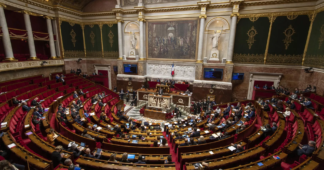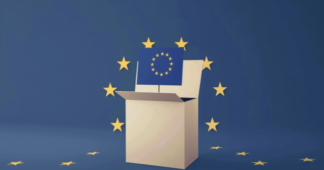By Marwan Emil Toubasi
While there are some similarities between the circumstances that led to the rise of the far right in the 1930s and the rise of current far-right movements in Europe, there are also significant differences in the historical, social and political contexts. These factors make it difficult to draw a direct comparison between the two periods, but they help in understanding the drivers that push some individuals and groups towards extremist ideologies in both times.
The French left wins as a result of counting seats, while the extreme right receives the highet popular electoral votes
Although the French Left Alliance ranked first in the elections in terms of the number of seats in Parliament, the ongoing transformations through an in-depth reading of the election results in terms of the number of votes still reflect increasing support for the extreme right-wing parties and their rise in various parts of the European continent, including France, where they are gaining more votes and seats in both national and European parliaments.
After the second round of the French elections, which ended last Sunday evening, the left-wing coalition, the New Popular Front, obtained in the final result 5.1 million votes, representing 27% of the electorate, which resulted in 182 seats in accordance with the mixed French ‘majority’ electoral law, which relies on… Electoral districts in additionPopular vote, achieving first place in terms of share of parliamentary seats.
As for President Macron’s center-right party, it received 22% and in return obtained 168 parliamentary seats, deserving of second place according to its parliamentary share.
As for the far-right “National Rally”, it topped the popular vote by obtaining 9.3 million votes from voters, or 37%. However, the mixed election law, which combined the two stages of the elections and mixed lists and districts, produced for it only 143 parliamentary seats out of a total number. Parliament’s 577 seats were dissolvedIn third place, despite receiving the highest votes, as I mentioned, by popular vote.
What is also noteworthy is that the far right was able, according to the results, to obtain 53 additional seats over its quota in the 2022 elections. On the other hand, although the base of the leftist coalition expanded with the joining of new political forces to the New Popular Front, it was only able to achieve 50 additional seats over the previous session, which constitutes a relative decline, while President Macron’s center-right party lost 76 seats over the previous session.
Formation of the French government
In this case, where the New Popular Front, the left-wing coalition, obtained the largest number of seats but without an absolute majority of the 577 parliamentary seats, the assignment to form the government will be complicated by multiple possibilities that may depend on alliances between the parliamentary blocs, allowing French President Macron to assign a personalityFrom outside the Left Alliance, his government will later gain the support of the parliamentary majority.
There are also signs of a crisis being created by the leaders of the regime in France today in order to try to exclude the leader of one of the components of the Left Alliance, “Mélenchion,” from being assigned to form the government due to their allegations of anti-Semitism as a result of his clear stances towards Palestine and his hostility to the Zionist movement, which could lead to discrepancies within the coalition. the lefthimself regarding this matter, the repercussions of which will not be easy.
The rise and expansion of the European far right
Recently, the far right has achieved notable successes in several European countries. In addition to France, in Hungary, Austria, Poland, Italy, Finland, the Czech Republic, and Slovakia, which witnessed a noticeable rise of the extreme right.
These transformations reflect increasing support for far-right parties in various parts of the European continent, as they gain more votes and seats in both national parliaments and the European Parliament.
Two days ago, the leader of the far-right, Viktor Orbán, Prime Minister of Hungary, and Marine Le Pen, the leader of the far-right in France, announced the signing of an agreement to form a new far-right bloc in the European Parliament after the elections that took place in the EU countries a month ago. I mentioned its details in a previous article that was published here. This alliance aims to strengthen cooperation between far-right parties in Europe, which includes parties such as the French National Rally, the Hungarian Fidesz Party, the Italian League Party led by Matteo Salvini, and the Italian Brotherhood Party led by Giorgia Meloni.
This step may make the far-right European Alliance the second largest bloc in the European Parliament.
The supposed justifications for supporting the European left
Although the atrocities of the French fascist right during World War II and their cooperation with the Nazi occupation formed a component of the memory of the historical consciousness of the French and other European peoples, this did not prevent the support and success of the far-right parties and the large popular vote for them. The left remains linked in collective memory to the resistance to Nazism and fascism, the resistance to the German occupation, and the defense of human rights and social justice, which was led by the French left, specifically the communists, over the decades against forms of occupation and exploitation.
Also, the US proxy war in Ukraine and its economic repercussions of poverty, unemployment, and the energy crisis on the European peoples, and the forms of political and economic hegemony exercised by the United States in Europe, did not prevent the European peoples from supporting the European right, which supports them, at the expense of supporting the leftist parties. For its part, it focuses on protecting weak and marginalized groups, strengthening social policies, and demanding an end to the war against the interests of the United States. In my opinion, these contexts were supposed to provide an incentive for European voters to search for more sustainable and fair alternatives to the left’s programmes, but they did not do so strongly.
The success of the experience of unifying the French left
However, this experience of the unity of the components of the French left, including the Proud France Party, headed by Melenchion, the Communist Party, the Socialist Party, and environmentalists from the Greens, in addition to unions and small leftist groups of Trotskyists and others, has formed a new phenomenon on the level of the experience of left parties in Europe, some of which suffer from an identity crisis. Intellectualism after the collapse of the Soviet Union and global transformations. However, these parties, despite their various components that I mentioned and a number of differences in positions among them, have placed the national interest of the French people and the necessity of confronting the rise of the extreme right before their responsibilities, through a basis of agreement on what is common and the exclusion of controversial issues in order to reach consensus regarding them later.
With this responsible approach of vision, clear strategy, work program, and selection of qualified candidates from the younger generation, the French Left Alliance was able to win a majority of seats in the outcome of the two electoral phases the day before yesterday.
The impact of these political transformations on our region in the Middle East
As for the Palestinian issue, with the left winning the majority of seats with the legal electoral result and the chances of forming a new government, which is based on alliances that will not be easy. Depending on its components, it is supposed to take a more supportive position on the issues of our Palestinian people in the presence of left-wing figures. But the extent of this depends on the type of alliances to form the new government after the left was unable to win an absolute majority that qualifies it to form the government alone, but it will push towards French recognition of the State of Palestine, as its leaders announced, and impose forms of boycott on the occupying state, especially in the field of weapons, through its necessarily presence in the government. The left in France will seek to strengthen the rights of our Palestinian people in international forums, and to depart from the hypocritical policy of the center-right and Macron.
It remains to be seen how these political transformations will translate from the continued rise of the extreme right, which supports the Zionist movement and the policies of the occupying state on the one hand, to the formation of the French government by the left according to what is supposed and the victory of the British Labor Party, which will take more balanced positions than the previous conservatives on our issue, despite the contradictions between them regarding SideAnd the French left on the other hand. If this succeeds, it will lead to practical policies that affect the international, European, and local French and British reality and the national cause of our people, towards stopping the war of genocide and getting rid of the settler occupation, towards freedom and democratic national independence on the basis of the unity of the land, the people, and the cause, awaiting what the American elections will lead to. Nearby.
What is required of us is to expand communication with the forces of the European left, which have fought and continue to engage in massive support for the issues of our people in the face of the policies of double standards of right-wing rule, European neoliberalism, and the Zionist movement cooperating with it, according to a clear strategy that is adopted at the level of all our people, and the PLO adopts programs and tools. Capable, on the basis of the unity of the land, the people, and the cause, to deal with these ongoing changes towards stopping the ongoing genocidal aggression and achieving national freedom and independence.
We remind our readers that publication of articles on our site does not mean that we agree with what is written. Our policy is to publish anything which we consider of interest, so as to assist our readers in forming their opinions. Sometimes we even publish articles with which we totally disagree, since we believe it is important for our readers to be informed on as wide a spectrum of views as possible.











